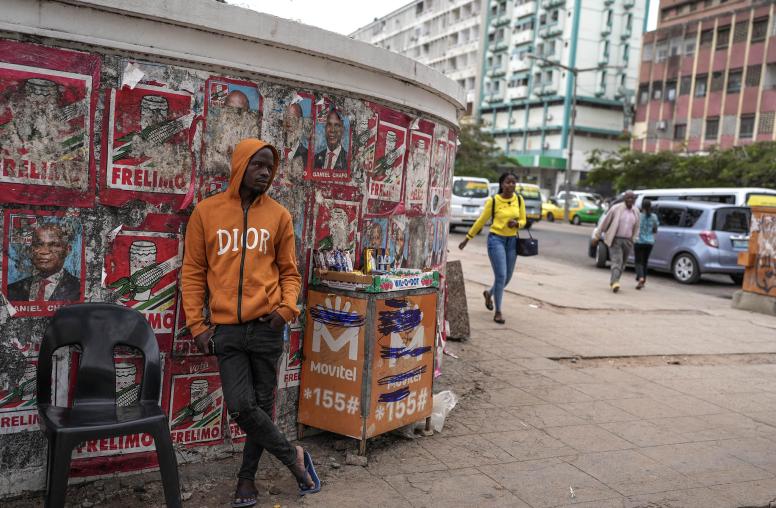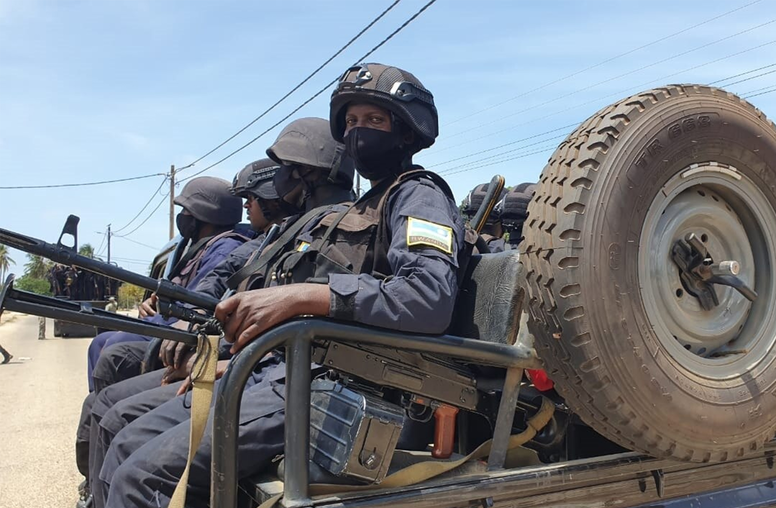Five Keys to Tackling the Crisis in Mozambique’s Cabo Delgado
Amid an opportunity to address broader challenges in Mozambique, the government and its international backers must act with urgency.
Since 2017, armed militants — often carrying the Islamic State flag — have been on the offensive in the northern Mozambique province of Cabo Delgado. The human toll of this violence is grave, with more than 3,000 killed, nearly a million displaced and an acute hunger crisis. While regional and international actors — namely, the Southern Africa Development Community (SADC), Rwanda and the European Union — are following up on committed troop deployments and training missions, the Mozambican government and its international supporters should bring an even greater sense of urgency to this crisis. Beyond the immediate priority of stemming the violence and addressing the dire humanitarian situation that is already affecting neighboring provinces, the crisis affords the government of Mozambique and the international community the opportunity to address long-standing challenges.

Background
With several thousand fighters, the Islamic State-affliated al-Shabbab has conducted increasingly sophisticated military operations, including by reportedly working intelligence cells within the Mozambican military. The militants have also improved their tactics and weaponry, as documented by a recent International Crisis Group report. Indeed, a March assault on the city of Palma led energy giant Total to declare force majeure concerning its massive natural gas investment in Cabo Delgado. The insurgency is taking advantage of a porous Tanzanian border and Mozambican coast. The Mozambican government has stressed al-Shabaab’s connections to outside terrorist organizations, drawing criticism for ignoring the Mozambican elements of the conflict. The reality is that foreign terrorist links do exist, with an influx of non-Mozambican jihadists inflaming local grievances.
The insurgents finance themselves by illicit activities, including extortion and kidnapping. There is potential for the conflict to expand into neighboring provinces, also rich in natural resources and ripe for militant exploitation, and even across borders. Under a best-case scenario, the insurgency in Cabo Delgado could take several years to tame. An urgency in addressing it is long overdue.
The Mozambican government has had some impressive accomplishments, most notably ending its brutal war with RENAMO that ran from 1977 to 1992. While flawed, the government has held a series of democratic elections. But the government has also remained a FRELIMO-dominated institution, with the liberation-era political party staying in power since winning independence. FRELIMO runs a heavily centralized government with provinces treated subserviently, allowing their people too little voice. The RENAMO political opposition party has pressed for decentralization in negotiations, winning greater powers for provincial governors, but the power balance between Maputo and provincial capitals has remained largely unchanged.
How to Respond
Here are five keys to tackling the crisis in Cabo Delgado:
1. The immediate priority should be stemming military advances by the militants while also addressing the dire humanitarian situation.
The insurgency in Cabo Delgado is fueled by legitimate economic and political grievances that must be addressed to build peace. The roots of the conflict are complex, but certainly include a long-standing sense among residents of being mistreated by the central government. This has been intensified by the recent large-scale development of natural resources, including major natural gas investments, that are seen as not benefitting the people of the province. There is profound suspicion that the government is conspiring to serve the economic interests of elites, even by conspiring with the insurgency to drive people off their land.
Major interventions by the government of Mozambique, supported internationally, are required to address economic and political issues and take the steam out of militant recruitment that exploits citizen disillusionment. There is little space for this type of reconciliation work, however, so long as the militants continue their successful operations and gain military and political momentum. While the government and its international supporters should employ military force judiciously, and prioritize civilian protection, it is imperative that they decisively establish security so that the government can begin to perform state functions.
There is much debate over the best configuration of military and intelligence assets to deploy in Cabo Delgado, with there being legitimate concerns about not employing foreign troops ill-suited for the region. This includes the 1,000 Rwandan troops now in Cabo Delgado. Regardless, any effective deployment will require considerable foreign support given the poor and overstretched state of the national military. The time for decisive security action is now.
2. Despite concerns about the Mozambican government, the international community should recognize that there is no equivalence between it and the militants.
Despite flaws in its 2019 elections, the government is internationally recognized, democratically elected and has the responsibility and right to deploy force if necessary to defend its sovereign territory. Al-Shabaab initiated the violence and are engaging in brutal and indiscriminate attacks against civilians, including reports of beheading several children. Militant attacks on infrastructure, including power supplies, have led to incalculable human suffering.
There have been cases of government security forces abandoning the defense of civilians and even committing abhorrent violence during operations against the militants. This has understandably led to harmful backlash, and individuals should be held accountable. But valid criticism of the government — which often overshadows criticism of the militants — should not fog the fact that only the government has the legitimate use of force.
3. The international community should press the government to address the legitimate economic and political grievances in Cabo Delgado.
Today’s insurgency has been decades in the making, stemming back at least to the beginning of the country’s 1975 independence. Rich in natural resources, Cabo Delgado has remained one of the country’s poorest provinces, with a large illicit economy. That’s partly due to developmental challenges common to Africa, partly to the government being distracted previously by years of civil war, and partly to exploitative government policy.
FRELIMO generals from the liberation era, mainly of the Makonde tribe, have used their connections to dominate Cabo Delgado businesses. Corruption is rampant by local officials in cahoots with national officials — trading illicit gems, wildlife and drugs — as Cabo Delgado has become a major international heroin transit point. The national government forcibly removed artisan miners from ruby fields in Montepuez in 2014 to the advantage of commercial interests, stirring unrest. Maputo has yet to address the challenges of relocation and local employment that has come with the massive development of natural gas infrastructure in Cabo Delgado, many believe.
The government is attempting to address these issues, including with its Integrated Development Agency, a $746 million initiative supported by bilateral and multilateral donors — including the World Bank — focused on humanitarian assistance, economic development, community resilience and communications in Cabo Delgado and two neighboring provinces. There are concerns about the transparency and effectiveness of this effort, however, given the government’s limited institutional capacity. Regardless, the FRELIMO-led government is responsible for using these and other resources to improve conditions in Cabo Delgado. The international community has an interest and obligation to establish and police standards for inclusive economic and social development in Cabo Delgado. Otherwise, peace is unlikely.
4. The government should better communicate with the people of Cabo Delgado.
Effective communications are a critical element of stemming militancy. Since this insurgency erupted in 2017, the government has spoken of it as a solely foreign-driven, Islamist-centered terrorist movement; President Filipe Nyusi has routinely spoken of defeating the “terrorists.” The government is right that the militancy involves foreign fighters, contains an element of Islamist radicalism and utilizes terrorist tactics. However, legitimate local grievances are fuel to the fire.
The Mozambican government should speak to the economic and political concerns of those in Cabo Delgado. In addressing the dire humanitarian crisis, it should amplify and condemn the atrocities being committed by the militants. Of course, words must be followed by actions, but step one is speaking of the crisis as being rooted in the province’s economic and governance challenges, including through local officials and civil society. Encouragingly, the government has shown signs of moving in the direction of honestly assessing, discussing and hopefully addressing the enduring challenges of Cabo Delgado.
5. The Cabo Delgado crisis is an opportunity to address broader challenges in Mozambique and improve local governance.
This crisis is spreading, creating untold human suffering in a country that has seen far too much, including by recent devastating cyclones. The government of Mozambique has too long ignored and otherwise misplayed the security challenge in Cabo Delgado. Yet there is some cause for optimism. The government will be receiving considerable revenues from the development of natural gas in Cabo Delgado, allowing for considerably greater social investment, if properly spent. The SADC has offered military assistance, as have other countries. The United States, European Union and others are providing military and intelligence training.
Most observers believe that the formula for peace in Cabo Delgado and elsewhere in Mozambique requires greater local autonomy so that all Mozambicans feel that their interests are represented. If the government implements decentralization and more participatory, transparent and accountable governance, combined with effective security operations, there is no reason why over time the insurgency in Cabo Delgado can’t be defused and all Mozambicans benefit.



